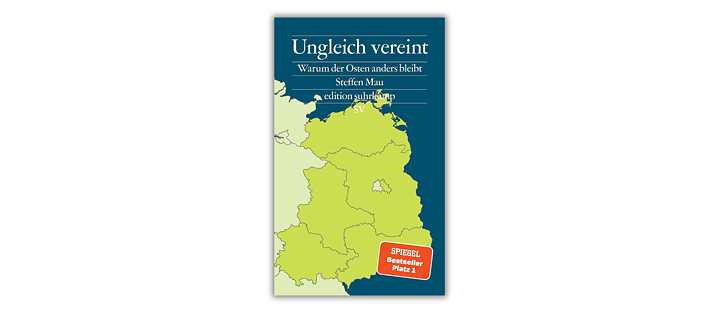Cherrypicker | Literature
The ossification of the East

After German reunification, many people believed that East German society would soon become more like West German society. For Steffen Mau, one thing is clear: that was an illusion - East Germany will remain different.
By Holger Moos
Ungleich vereint (Unequally united) is the title of Steffen Mau's new book. The sociologist from Berlin's Humboldt University begins by stating that the discourse on East Germany is going round in circles. The findings are complicated and contradictory. On the one hand, East Germans are accused of being a notoriously dissatisfied people who like to play the role of victim and who also have democratic deficits that stem from the dual (insufficiently dealt with) experience of dictatorship under National Socialism and socialism. On the other hand, the history of the GDR and East German life stories should not be reduced to the experiences of dictatorship.
Last year, a book by literary scholar Dirk Oschmann caused a debate. He claims that the East is merely a West German invention. It serves to cement the hegemony of the West and keep the East down. A thesis that Mau contradicts several times in his book. He emphasises the independence of East German political and social culture, which from a Western perspective is sometimes perceived nothing more than politically incorrect waywardness.
According to Steffen Mau, the journalist Cornelius Pollmer summed up the typical discourse about East Germany in his criticism of Oschmann's book in a humorous and apt way as "Los Wochos in Lostdeutschland". The process always follows the same pattern: "Someone says something about the East, then there is a 'debate', at the end all the debaters are tired and feel even more 'Greek' than usual." After that, "nothing happens for a while. Then it starts all over again."

Welcome to the post-transformation society
For too long after reunification, people believed that over the years there would be an almost automatic convergence of living conditions and, above all, mentalities and identities between East and West. All that was needed was to pump enough money (and Western elites) into the East, then happy and grateful people would grow up in the promised ‘blossoming landscapes’ and the spruced-up historic city centres. In addition to the different social environments and the identities that could not be easily levelled, another main problem, according to Mau, was that the "reconstruction of the East" was only ever conceivable as a "replica of the West".To this day, the political goal is to "complete internal social and economic unity", as stated in the current coalition agreement between the Social Democrats, the Greens, and the liberal party (FDP). For Mau, however, one thing is clear: the transformation phase in the East is over, welcome to the post-transformation society! We must therefore say goodbye to this political wishful thinking, the reality has long since changed. Mau finds further contradictions in the convergence theory. It is of course desirable that the East should converge with the West when it comes to economic living conditions. The richest people living in East Germany are still West Germans, and just two percent of the German inheritance tax is paid in East Germany. But should the East also adapt to the West when it comes to rents, the employment rate of women, the gender pay gap, daycare coverage, or the density of theaters? In all of these areas, the East is better off than the West.
Ossification and regeneration
Mau finds a nice metaphor from the world of medicine for his thesis that the East will remain different in the long term: ossification. This phenomenon is "somewhat open to interpretation, because it describes both (possibly pathological) ossification and regeneration after a fracture."Mau by no means plays down the worrying developments in the East, be it the demographic problems (shrinking and ageing population), the lack of trust in institutions, the relatively low number of party members or the associated electoral success of the AfD (Alternative für Deutschland, Alternative for Germany, a right-wing populist political party)). However, Mau analyses the situation intelligently and objectively, without any tendency to scaremongering or hysteria. East Germany is certainly a difficult place politically, but German unity is not being called into question.
In the last chapter, he even sketches out a small utopia: the East as a "laboratory for participation". Mau makes a classic educational proposal. He advocates the introduction of citizens' councils to promote the idea of active participation and to demystify populism. He is aware of the criticism of such instruments of direct democracy, but democracy cannot be strengthened by "better" communication from party headquarters alone. It is precisely the weak party loyalty in East Germany, which stems from historically conditioned alienation from (West German) party democracy, that makes alternative forms of citizen participation absolutely necessary. Otherwise, there is a risk of an ossification that can definitely be described as pathological between two currently powerful alternatives in East Germany: the success of the AfD and the relatively large proportion of non-voters.
Berlin: Suhrkamp, 2024. 168 p.
ISBN: 978-3-518-02989-3
You can find this title in our eLibrary Onleihe